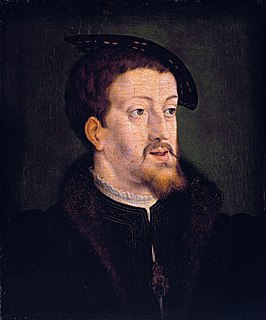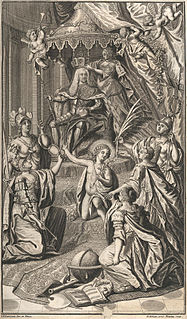
Adolf was Count of Nassau from about 1276 and elected King of the Romans from 1292 until his deposition by the prince-electors in 1298. He was never crowned by the Pope, which would have secured him the title of Holy Roman Emperor. He was the first physically and mentally healthy ruler of the Holy Roman Empire ever to be deposed without a papal excommunication. Adolf died shortly afterwards in the Battle of Göllheim fighting against his successor Albert of Habsburg.

The Schmalkaldic War refers to the short period of violence from 1546 until 1547 between the forces of Emperor Charles V of the Holy Roman Empire, commanded by the Duke of Alba and the Duke of Saxony, and the Lutheran Schmalkaldic League within the domains of the Holy Roman Empire.

The Electorate of Saxony was a state of the Holy Roman Empire established when Emperor Charles IV raised the Ascanian duchy of Saxe-Wittenberg to the status of an Electorate by the Golden Bull of 1356. Upon the extinction of the House of Ascania, it was feoffed to the Margraves of Meissen from the Wettin dynasty in 1423, who moved the ducal residence up the river Elbe to Dresden. After the Empire's dissolution in 1806, the Wettin Electors raised Saxony to a territorially reduced kingdom.

The Diet of Regensburg of 1623 was a meeting of the Imperial States of the Holy Roman Empire convened by Holy Roman Emperor Ferdinand II. The meeting was not technically an imperial diet in the full sense, but a convention of princes or Deputationstag – a looser constitutional format giving the emperor greater leeway to take decisions without being bound by formal procedures. At it the Electorate of the Palatinate was transferred to Maximilian I of Bavaria. The meeting marked the high-water mark of imperial power during the Thirty Years' War.
Rudolf I, a member of the House of Ascania, was Duke of Saxe-Wittenberg from 1298 until his death. By the Golden Bull of 1356 he was acknowledged as Elector of Saxony and Marshal of the Holy Roman Empire.
The imperial election of 1486 was an imperial election held to select the emperor of the Holy Roman Empire. It took place in Frankfurt on February 16.

The imperial election of 1519 was an imperial election held to select the emperor of the Holy Roman Empire. It took place in Frankfurt on the 28th of June.
The imperial election of 1562 was an imperial election held to select the emperor of the Holy Roman Empire. It took place in Regensburg on November 28.
The imperial election of 1575 was an imperial election held to select the emperor of the Holy Roman Empire. It took place in Regensburg on October 27.

The imperial election of 1612 was an imperial election held to select the emperor of the Holy Roman Empire. It took place in Frankfurt on June 13.
The imperial election of 1619 was an imperial election held to select the emperor of the Holy Roman Empire. It took place in Frankfurt on August 28.
The imperial election of 1636 was an imperial election held to select the emperor of the Holy Roman Empire. It took place in Regensburg on December 22.
The imperial election of 1653 was an imperial election held to select the emperor of the Holy Roman Empire. It took place in Augsburg on May 31.
The imperial election of 1658 was an imperial election held to select the emperor of the Holy Roman Empire. It took place in Frankfurt on July 18.
The imperial election of 1690 was an imperial election held to select the emperor of the Holy Roman Empire. It took place in Augsburg on January 23.
The imperial election of 1711 was an imperial election held to select the emperor of the Holy Roman Empire. It took place on October 12.

The imperial election of 1742 was an imperial election held to select the emperor of the Holy Roman Empire. It took place in Frankfurt on January 24. The result was the election of Charles Albert of Bavaria, the first non-Habsburg emperor in hundreds of years.
The imperial election of 1745 was an imperial election held to select the emperor of the Holy Roman Empire. It took place in Frankfurt on September 13.
The imperial election of 1764 was an imperial election held to select the emperor of the Holy Roman Empire. It took place in Frankfurt on March 27.

The imperial election of October 20, 1314 was an imperial election held to select the emperor of the Holy Roman Empire. It took place in Frankfurt.







